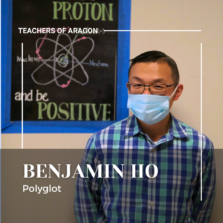By Ashley Mao and Isabel Chao
At Aragon, 16 percent of seniors may be the first in their families to attend college. Like the 32 percent of college freshmen across the nation that are first generation college students, these college-bound students traditionally carry financial, social, familial, and academic burdens.
Often, first generation college bound students feel that their parents’ education level sets them apart from their peers. Aragon alumna Amy Chen says, “It was weird comparing myself to my peers, especially at a school like Aragon. This person’s parent was a brain surgeon, and that person’s parent was a lawyer, whereas mine barely spoke intelligible English.”
Perceived social stigmas regarding a typified first generation student’s achievement may make students vulnerable to stereotype threat, a term coined by Claude Steele, author of “Whistling Vivaldi.” Steele describes stereotype as a phenomenom in which one unconsciously adheres to negative stereotypes that others impose.
In line with the concept of stereotype threat, English teacher Tiffany Wang says, “When you feel like you are the only one or feel like you have a low status, whether it’s cultural or capital or social status, you tend to learn less than the people who are perceived as having a higher status.
So, if our students feel like they are alone, that they are the only people or that they would learn less, they feel less successful and in turn, would be less successful.”
To offset the effects of stereotype threat, Aragon English Learner Specialist Edwin Martinez believes that despite stigmas embedded in the fabric of society, first generation college students remain in power to define their image. He says, “I really like the idea of [giving] more of a positive image to the public. The message that you are sending is ‘Yes, I can do it. Just give me the opportunities, and I can do it.’”
Following this mindset, Chen says, “I’ve never felt different from anyone else in school at Aragon or at UCSD. Both communities are very accepting and I feel that as long as I work hard like everyone else, where I come from doesn’t affect where I will stand in the future.”
Aragon alumna Jennifer Saldaña, who is also a first generation college student, experienced the impact of financial burdens, especially during the college registration process. Saldaña says, “There were moments when I hesitated [when] I was trying to figure out how to plan my next four years of college, what classes to enroll in, and how to spend the least amount of money.”
Martinez also noticed that the high cost of living in San Mateo has affected students and their families, saying, “There’s not really an affordable house around here; people are struggling to pay the rent. I have a student who told me, ‘I have to go to high school, but I also have to go to work because I have to help my mom to pay rent.’”
Financial burdens can add up. USA TODAY claims that 89 percent of low-income first generation students drop out of college within six years without a bachelor’s degree, paritally due to financial responsibilities.
While this may be true, financial aid, student loans, and scholarships are available to students with such needs. To help students access resources, Aragon offers financial aid workshops for students and parents; however, students may still feel limited although financial aid is available. Martinez says, “When we talk about financial aid, they are afraid to ask for it.”
Financial advisor Melissa Aliu has also noticed that language can be a hindrance during college applications. “First generation students can have households where English is not their first language. We have translators here who are familiar with the financial aid applications because language shouldn’t be a barrier between a first generation student receiving scholarship resources.”
According to Aliu, some of Aragon’s first generation college students are also immigrants and at times are undocumented; for them, federal financial aid may seem out of reach; however, these students can apply for President Obama’s DREAM Act (Development, Relief, and Education for Alien Minors) under outlined conditions.
Community colleges can provide another avenue for financial support. Aliu says, “In the past, when I worked at the College of San Mateo, they offered so many resources for first generation students to where it was almost 100 percent of students who applied for financial aid got it. That is huge because it reflects how great an opportunity that students can have from that outlet.”
Besides financial aid, Aragon offers myriad resources for students to address academic needs. “The AVID (Advancement via Individual Determination) program is designed for students who are historically in the middle academically. They might not have parents who have gone to college,” says math and AVID teacher Don Bush.
AVID serves students by addressing their specific needs. “If students have parents who went to college, they are probably having [conversations about college] with their parents in elementary school. When they get to middle school, they’re making sure they are in the right classes. When they get to high school, they’re making sure they’re in the right classes,” Bush says, “A student who has parents who have never gone to college may not be having those conversations. The first time that they have thought about college might be ninth or tenth grade, and in many instances, it might be too late. They don’t have parents that can tell them, ‘Oh yeah, you need to start getting ready for the SAT.’ If you don’t have parents who have gone to college, that’s foreign, so AVID tries to fill in that gap and have those conversations with those students.”
Regarding Aragon support, Aliu says, “[Aragon staff members] take first generation students’ situations sensitively and seriously because each first generation student is a different student, and we have to cater to their specific needs. We have our SSA or school psychologist that help cater to first generation emotional and counselors for academic needs,” says Aliu.
First generation college bound junior Briseyda Cruz Solorio addresses her academic challenges. Cruz says, “My grades have been a barrier for me as a first generation student. I go to after school tutoring and ask my teachers for help.”
According to the Washington Post, 69 percent of first generation students want to help out their family by going to college, while only 39 percent of students who are not first generation students have that motive, indicating a difference in motivations and perceived worth.
First generation junior Jennifer Vasquez-Miranda is motivated by what she believes she can contribute to her family. Vasquez-Miranda says, “I’ve always wanted to see [my dad] happy because he’s the one that has raised me and my siblings since I was very little. I want to help my other siblings out, too. I want for them to go to college after me. My siblings are younger than me and look up to me so they could follow my example. My dad pushes me to do better … giving back to my dad, and making him happy is my main motivation.”
Many parents also support their child’s efforts to achieve higher education. Martinez says, “They understand the importance of a college degree. Families can be dreamers about their children … but at the same time, they know they will be happy just to [know that their child finished] high school because [they] were not able to finish high school in their country.”
Despite the desire to help, parents may be limited in their capacity to help their child. Regarding college applications, first generation college bound senior Sarah Aristondo says, “I know I have my parents’ support, but it’s extremely hard for them. Explaining to my parents every step of the way towards college was difficult. It’s stressful for me as well, because I have to do the college process on my own, and they don’t know anything about college, but I’m grateful for their support.”
First generation students’ experiences are often heavily influenced by family encouragement. “My family has influenced me the most because they have taught me to never give up on my dreams and always be humble. One thing that always stuck to me from my parents is to do things the right, honest way and to always give more than 100 percent in everything I do, and if I get stuck, that I keep trying my best,” Aristondo says.
Chen believes her accomplishments emerged from her ambition and inspiration from both her family and herself, saying, “I like being the first in my family to attend college because I know that I have made my parents proud and have also taken full advantage of what they’ve given me through their hard work.”
Just like Chen, the status of being a first generation student motivated and empowered Saldaña. “I am able to show my parents how mature I can be with handling my own situations, like registering for my classes, paying for my classes, set up meeting with counselors. I am able to show them that I make school my priority,” Saldaña ends.




